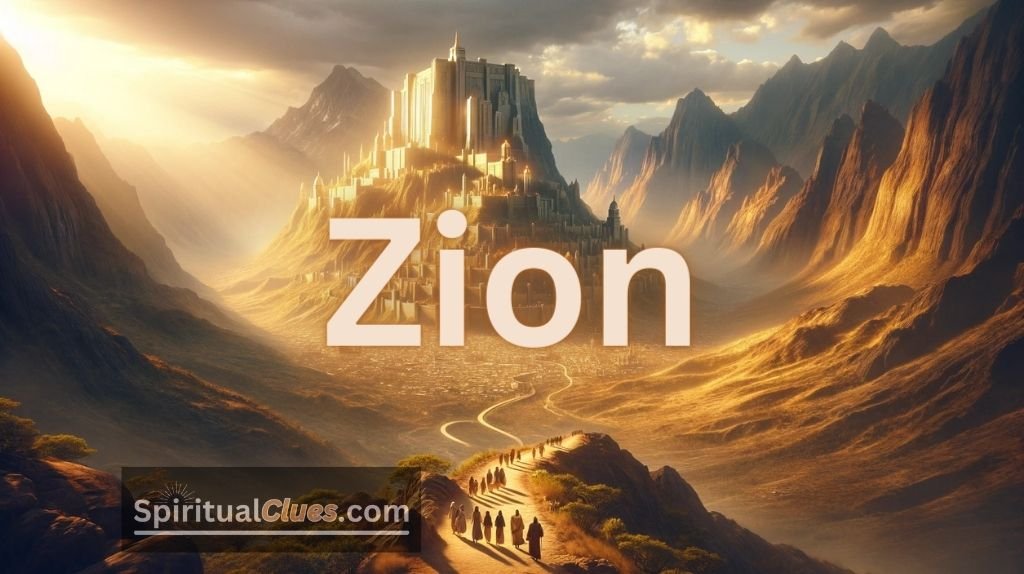- Zion carries deep spiritual significance in various cultures and religions, symbolizing a connection between God and his people.
- The origin of the name Zion is rooted in biblical history, representing the holy city of Jerusalem and the Promised Land.
- Zion holds metaphorical meaning, representing spirituality, the Kingdom of God, and hope for redemption and salvation.
- Beyond spiritual meaning, the name Zion is associated with positive personality traits and provides a unique and meaningful choice for parents seeking depth and tradition.
The name Zion has deep spiritual meaning and significance across different cultures and religious traditions. From its biblical origins to the modern use of the name today, Zion evokes a sense of spiritual connection, hope, and the divine. This article explores the spiritual meaning of the name Zion and its rich history.
The Origin of the Name Zion
The name Zion comes from the Hebrew word “Tsiyyon,” referring to a Canaanite fortress that was conquered by King David and declared the “City of David.” Over time, Zion came to refer to the mountain on which the city sits, Mount Zion in Jerusalem. Zion represents the connection between God and his people, as it is the location of the holy Temple in Jerusalem and is considered the holiest site in Judaism.
Zion is also often associated with the “Promised Land,” Jerusalem, and more broadly, the land of Israel. So from early on, Zion had spiritual meaning for the Jewish people as the symbolic dwelling place of God on Earth.
Spiritual Meaning of the Name Zion
The spiritual meaning of Zion developed over centuries to embody a deep symbolic significance. Beyond just referring to the actual mountain or city, the name Zion took on additional religious meaning to encompass the ideas of spiritual connection, the Kingdom of God, and hope.
Zion became a symbol of the Jewish people’s enduring relationship with God – it represents their spiritual growth and shows that God dwells among his chosen people. So Zion also took on a meaning related to the covenant between God and his people.
Additionally, Scripture presents Zion as the future capital of the Kingdom of God during the end times. So the name evokes a sense of hope and anticipation regarding humanity’s spiritual redemption. The book of Revelation refers to the “New Jerusalem” using imagery from the actual city of Jerusalem and Mount Zion.
So in summary, the spiritual meaning behind the name Zion includes ideas like:
- Divine presence/connection with God
- The Promised Land/Kingdom of God
- Spiritual redemption/hope
- Enduring religious covenant
The Significance of the Name Zion in Different Cultures
While Zion has the deepest roots in Judaism, the name developed spiritual significance in other faiths as well.
In Christianity, Zion represents God’s spiritual kingdom and the hope of salvation through Jesus. The book of Hebrews in the New Testament builds upon the Hebrew Bible’s references to Mount Zion.
Additionally, in Islam, the prophet Muhammad ascended to heaven from the location of the ancient Temple Mount in Jerusalem, tying the area of Mount Zion to the divine realm. The Temple Mount compound, known as Al-Aqsa, derives its Arabic name from “the farthest mosque” referenced in the Quran regarding Muhammad’s ascension.
So while the name’s meaning originated within Judaism, Zion became a universal symbol of the connection between the heavenly and earthly realms across different religious traditions. Regardless of faith, Zion represents humanity’s spiritual redemption and hope.
Biblical Meaning of the Name Zion
Throughout the Hebrew Bible, Zion appears numerous times, developing rich theological meaning. As described previously, Zion started as referring to the actual Jebusite fortress conquered by King David to be his royal city, Jerusalem.
The Hebrew word “tsiyon” first shows up in 2 Samuel 5:7: “David captured the fortress Zion that is now the City of David.” Over 160 additional uses of the term Zion occur in the biblical texts, each adding meaning to the term’s spiritual symbolism.
Zion becomes associated with the holy Temple and God’s divine presence filling the Temple. Zion represents the spiritual connection between God and his chosen people through worship within his earthly dwelling place.
Numerous prophetic and poetic passages present Zion as prized by God and detail his commitment to protect it. So Zion takes on additional meaning regarding God’s eternal covenant with his people. It represents his promise to redeem humanity and care for them within his Kingdom.
So in the Bible, Zion moves from a literal to an increasingly metaphorical meaning, representing the spiritual relationship between God and his people tied to Temple worship and eternal salvation.
Personality Traits Associated with the Name Zion
Beyond the rich spiritual meaning, the sound and origin of the name Zion evoke certain positive personality traits.
Names carrying biblical significance often impart a sense of strong values and depth of character. Additionally, the Hebrew origin of Zion expresses concepts like strength, endurance, and connection.
So people named Zion may express personality aspects like:
- Depth and sincerity
- Strong principles and conviction
- Loyalty and commitment to relationships
- Sense of heritage and history
The strong spiritual meaning behind the name can inspire these types of positive qualities. A person named Zion may feel linked to something larger than themselves, which can lead to maturity and purpose.

Analyzing the Zion Name Numerology
Another interesting perspective on the name is found in the numerology of “Zion.” Zion has a 5 numerology value, representing concepts like:
- Freedom
- Fun
- Variety
- Adaptability
So while the spiritual implications evoke depth and tradition, Zion’s numerology introduces elements of dynamism, change, and lively experience.
Together, they present Zion as a name representing the integration of opposing qualities – traditionalism balanced with contemporaneousness, solemnity balanced with vibrancy. This integration encapsulates Zion’s meaning of connecting the heavenly and earthly.
Famous People Named Zion
While initially biblical, the name Zion is growing in popularity for modern children as parents recognize the rich meaning. Famous figures named Zion include:
- Zion Williamson – Professional basketball player
- Zion Moreno – Transgender actress starring in the series “Control Z”
So people named Zion express both traditional spiritual depth as well as vibrant, boundary-pushing creativity.
Popularity of the Name Zion
The name Zion has risen in popularity over the past couple of decades as parents seek biblical names with profound meaning.
- In the US, Zion was the #177 most popular boy’s name in 2021
- For girls, Zion ranks lower but is quickly gaining ground as a gender-neutral name
- The name reached peak popularity in 2017 for boys and 2021 for girls
Zion will likely continue growing in usage for both boys and girls given positive name trends focused on tradition, meaning, and spiritual connection.
Nicknames for the Name Zion
Nicknames can provide nice options for the relatively long, three-syllable name Zion. Possible nicknames include:
- Z (or “Zee”)
- Zionny
- Zye
Zion also conveniently contains common nicknames like Ian or Sonny. Having nickname options allows flexibility whether for a child or adult named Zion.
Some Middle Names for the Name Zion
Middle names provide a nice opportunity to balance and expand meaning when considering baby name options. Here are some middle name ideas that complement the first name Zion:
For boys:
- Zion Jacob
- Zion Isaiah
- Zion David
- Zion Josiah
- Zion Gabriel
For girls:
- Zion Grace
- Zion Hope
- Zion Joy
- Zion Faith
- Zion Promise
Using other biblical or virtue names in the middle spot builds additional positive spiritual imagery with Zion.
Different Variations of the Name Zion
Zion is unique and rare in terms of variant spellings, but a few can be found including:
- Sion
- Tzion
- Zyion
Sion is the oldest form – an anglicized transliteration from the Hebrew. The others just represent different spelling interpretations. Zion has become standardized in its common spelling across cultures.
Is Zion the Right Name for Your Child?
Given the profound spiritual meaning spanning thousands of years and across religious traditions, Zion would make a meaningful name choice. It provides wonderful depth and significance.
Points to consider:
Pros
- Imparts spiritual connection
- Evokes traditions and history
- Promotes maturity and purpose
- Offers positive name trends – biblical and gender-neutral
Cons
- Meaning can feel heavy for a child
- Mispronunciation likely
- Nickname needed for versatility
Ultimately Zion is best for parents who desire a name imprinting depth, tradition, and divine link – one that will grow beautifully with a child into adulthood. It makes a unique choice with rich implications.
Related Articles You May Also Like:
- Spiritual Name Meanings
- Spiritual Meaning of the Name Hailey: Abundance and Provision
- Spiritual Meaning of the Name Hazel: Wise and Creative
- Spiritual Meaning of the Name Alyssa: Noble Kind
Conclusion
The name Zion emerged from an ancient Hebrew fortress to represent humanity’s enduring connection to the divine across religious traditions. It encompasses profound ideas of spiritual redemption, the Kingdom of God, divine presence, and eternal salvation. While originating within Judaism, Zion became a universal symbol of God’s relationship with creation.
Beyond the religious significance, Zion implies positive personality traits of conviction, loyalty, strength, and depth. The numerology presents a fascinating balance as well – pairing tradition with contemporary dynamism.
As an increasingly popular name choice today, Zion offers parents a way to imprint spirituality and link to heritage within a child’s journey of identity. The richness of the name will inspire maturity, purpose, and a symbolic sense of something greater than oneself.


